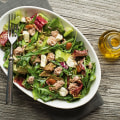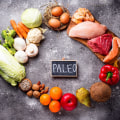Continued low carbohydrate intake can lead to overuse of fat for energy or ketosis. Why? Because processed grains are banned and are the easiest source of carbohydrates to eat. The paleo diet is not ketogenic, and it's important to remember that the paleo diet is a personalized diet. There is no single standard across the board for all people.
You can still rely on the general rule of not eating cereals or processed foods, and while we can't give you an exhaustive list of all your options (that would take many pages and wouldn't be much help), we can guide you in the right direction with the most common carbohydrates suitable for paleo. Although quinoa isn't technically a grain and is more closely related to spinach or beets, for quinoa to be edible it has to be processed, which is why paleo eliminates grains and legumes. So, in the end, while it may fall into the paleo category if you look at it from a certain angle, quinoa works against paleo in practice because of its harshness for the digestive system and its nutritional content. Here's the thing: While paleo is a dietary lifestyle with obvious restrictions, there's no need to be absolutist about it.
Did hunter-gatherers eat white potatoes? non. Are they OK with a paleo diet? sure. Safe starches that don't contain added toxins are a good addition to any active, healthy lifestyle. Should half of your diet consist of white potatoes and other starchy carbohydrates that are packed with carbohydrates? Isn't it?.
However, half of your diet shouldn't consist of any particular type of food, and you can still lose weight if you eat carbohydrates. For a full rundown of white potatoes and why people tend to object to them, Paleo Leap has an excellent article. Nathan Phelps is a food enthusiast, writer, vendor, and musician who lives in the big city of Nashville, TN. He loves the intersection of healthy eating, 26% of science, and his daily activities include using coffee shops as offices, morning optimism, afternoon doubts, and a little regret at night before bed.
And while the AMDR for carbohydrates, which are estimated to be between 45 and 65 percent of total energy (and less than 25 percent comes from sugars) doesn't quite align with hunter-gatherer intake, it does support the principle that eating too few carbohydrates can harm us in terms of fiber, vitamins, minerals, and phytochemicals. Therefore, there is no scientific evidence to support the idea that carbohydrates will magically cause you to gain weight if you eat them after a certain time of day. Low-carb diets promote weight loss (and achieving a healthy weight reduces the risk of diabetes, cardiovascular disease, etc.). Your body keeps producing more and more insulin, trying to get carbohydrates into your muscles and organs, but there's simply no space and eventually your muscles stop listening to the insulin signal.
On the other hand, too few carbohydrates (with lots of proteins and fats) could mean a shortage not only of fiber, but also of certain nutrients and phytochemicals found in greater abundance in foods rich in carbohydrates, even if quality options are chosen (such as vitamin C, polyphenols, chlorophyll, carotenoids, isothiocyanates, and organosulfur compounds, all of which play a variety of roles in preventing diseases). Carbohydrates in whole foods, such as fruits and vegetables, contain a mix of simple and complex carbohydrates, including fiber, which delays digestion itself and lowers the blood sugar response. If you want to try the carb cycle, follow a whole-food diet and pay close attention to how you're feeling along the way. This is also the reason why many athletes who follow a paleo diet add white rice to their diet to increase their carbohydrate intake.
Hunter-gatherer diets (our best modern estimate for Paleolithic diets) are not uniformly low in carbohydrates, nor uniformly anything else. The Paleo diet eliminates the main sources of carbohydrates in the typical American diet, so it's easy to assume that it's designed to be a low-carb diet. Tubers and fruits have a lower proportion of carbohydrates to those that don't contain fiber, but they're also denser sources of fiber (see Why Tubers Are Great for the Gut Microbiome and Why Fruit Is a Good Source of Carbs). If you haven't made a conscious effort to limit your carbs, eliminating them completely can cause a series of unpleasant side effects that, combined, feel like you're having something unpleasant.
One of the most important changes in Western diets (including the standard American diet) over the past 50 years is the replacement of whole-food carbohydrate sources with refined carbohydrates. .




